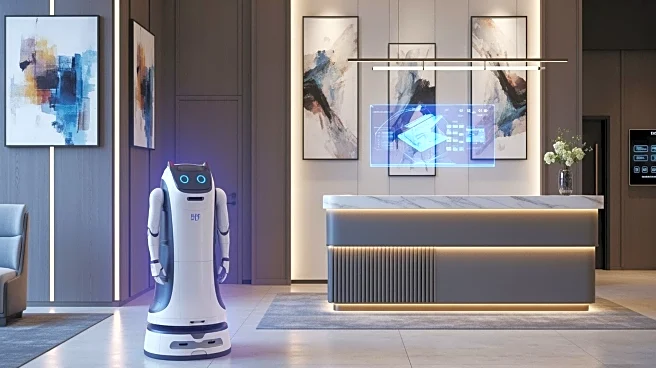What's Happening?
The hospitality industry is undergoing a transformation with the integration of artificial intelligence (AI) into hotel management systems. According to the 2026 Hotel PMS Report, 91% of operators now recognize their Property Management Systems (PMS)
as crucial to profitability, transforming them into predictive engines for staffing, pricing, and marketing. AI is enhancing guest experiences through chatbots and virtual concierges, improving operational efficiency with predictive housekeeping and automated maintenance, and boosting commercial performance with real-time revenue intelligence platforms. These advancements are leading to measurable gains in RevPAR and guest satisfaction scores.
Why It's Important?
The adoption of AI in hospitality is reshaping the competitive landscape, allowing hotels to transform data into actionable insights faster than ever. This shift is not only improving operational efficiency but also enhancing guest satisfaction by personalizing services and reducing friction in guest interactions. The ability to predict occupancy trends and optimize staffing in real-time provides a significant competitive advantage, particularly for independent hotels that can now compete with larger chains by leveraging AI-driven tools. The integration of AI is also driving a more sustainable and efficient use of resources, contributing to the industry's overall growth and profitability.
What's Next?
As AI continues to evolve, the hospitality industry is expected to see further integration of AI tools into daily operations, with a focus on data governance and ethical standards. Hotels will need to maintain clean, connected data ecosystems and empower staff to work alongside automation. The future will likely see a balance between human interaction and AI-driven processes, ensuring that the personal touch remains a key component of hospitality. The ongoing development of AI technologies will continue to drive innovation and efficiency, setting new standards for guest experiences and operational management.
Beyond the Headlines
The rise of AI in hospitality raises important considerations around data privacy and the need for transparent audit trails. As hotels adopt AI-driven tools, they must ensure that these technologies align with brand voice and service tone to maintain consistency in guest communications. The democratization of AI tools is leveling the playing field between large hotel chains and independent operators, fostering a more competitive and dynamic market. This shift towards AI-driven hospitality management is redefining the industry's approach to service delivery and operational excellence.
















